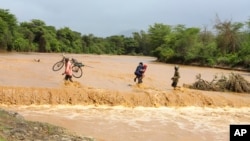Scientists from the World Weather Attribution group, WWA, say the current rainfall "was one of the most intense ever recorded in the region" between October and December.
The WWA's sentiments were in reference to heavy rainfall that has grappled Somalia, Kenya and Ethiopia.
The rains have also has caused flooding in the latest devastating climate disaster to strike the Horn of Africa and East Africa, after a record drought.
"Climate change also contributed to the event, making the heavy rainfall up to two times more intense," WWA said in a report issued this week, adding that the exact contribution of global warming was unknown.
The Indian Ocean Dipole, IOD — a climate system defined by the difference in sea surface temperature between western and eastern areas of the ocean — also added to "unusually extreme" rainfall, the WWA report said.
The WWA noted "that as long as the planet continues to warm, heavy rainfall events such as this one will be more frequent in East Africa," the report added.
The Horn of Africa is one of the most vulnerable regions to climate change — even though the continent's contribution to global carbon emissions is a fraction of the total.
"The prolonged hardship caused by the drought meant many people struggled to cope with the devastating rainfall" in the region, the report said.
The scientists called for the urgent phasing out of fossil fuels and reduction of emissions as the extreme weather "has the potential to overwhelm the response of governments and humanitarian organizations" in East Africa.
Extreme weather events are occurring with increased frequency and intensity.
The rains have displaced more than two million people in East Africa, almost half of them in Somalia.
The disaster has killed more than 100 people in Somalia, at least 165 in Kenya and 57 in Ethiopia.
In one of the hardest hit areas, the Somali region in eastern Ethiopia, cholera has claimed the lives of at least 23 people, with more than 700 confirmed cases.








Forum